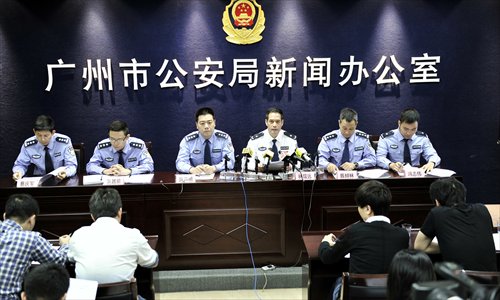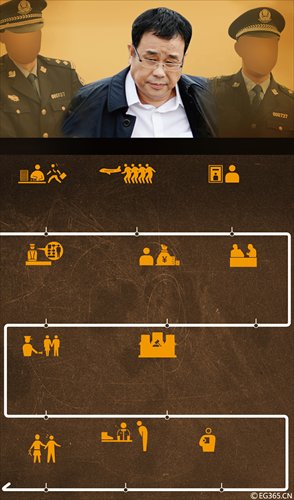US wants China to receive deported immigrants in exchange for extradition of corrupt officials: experts

Guangdong provincial police holds a press release talking about the fled corrupt officials they have caught in another campaign, the "Fox Hunt." Photo: CFP

Li Huabo being exported back. Photo: CFP
This April, China launched the "Skynet" initiative to hunt down corruption suspects that have fled overseas. At the same time the US authorities have been raiding the homes of Chinese immigrants and detaining some that were convicted of felonies decades ago. While these two things seem not to be linked, working out how to deport these people in the absence of extradition treaties has become a crucial issue for both nations.
For Daniel Maher, a resident of Berkeley, California, the last two months have been filled with anxiety. For years, this fear has been in the back of his mind. He has been careful, quiet and diligent, but still occasionally haunted by nightmares.
But his past finally hunted him down. On June 2, he was arrested by six armed US Immigration and Customs Enforcement (ICE) agents.
A crime he committed 20 years ago had caught up with him once again.
Maher was born in Macao. He was only 3 years old when his parents took him to America from the then Portuguese colony. Macao was reunited with the Chinese mainland in 1999.
In December 1994, he was convicted by a US court of kidnapping, second-degree robbery and possession of a firearm. He was sentenced to 11 years and four months behind bars.
But his conviction lost him his right to stay in the US. In 2000, a judge ordered his deportation. In 2001, deportation officers wrote a report and stated that Maher was "bright and seems committed to living a legitimate and law-abiding life if released."
Maher was set free in August 2001 based on his good performance in prison and community service. He was given a supervision order which meant he had to report regularly to a deportation officer or face being kicked out of the country.
Since his release, he has been working for a local nonprofit ecological center in Berkeley.
Earlier this year, US and Chinese law enforcement officials held talks in Washington DC. US news reports said both Skynet - a Chinese campaign to catch corrupt officials who have fled abroad - and illegal immigration issues were raised during the talks.
China has asked the US to extradite Chinese nationals suspected of corruption despite the absence of an extradition treaty. Experts said in exchange for the extraditions, the United States wants to send back thousands of Chinese citizens to their homeland. The issue of immigrants has been a tricky problem for both sides for decades.
"There are mainly three types of illegal situations with these immigrants; the first type are those that have problems with their documents such as Chinese holding other nations' passports; the second type, Chinese citizens that have US residency but have committed crimes; the third type, Chinese nationals that destroy their passports and ID documents. After that, they go to local UN high commissions and claim that they are refugees and apply for refugee status. They became 'stateless' people. Maher belongs to the second type. It is the third type - the 'stateless' type - that are the most thorny issue," Zha Daojiong, professor of international relations at Peking University said.
A US State Department report claims there are more than 30,000 "stateless" Chinese citizens in the US that Washington want China to accept.
However, the Chinese authorities will not allow these people to be repatriated as they are undocumented.
Maher is lucky. His honesty and community work paid off.
In the 60 days after his arrest, the Asian Law Caucus, a local NGO, set up a Facebook page to urge residents to call the ICE to plea for Maher's release. They argued that Maher has dedicated his life to improving the environment and his community.
On August 8, Mahler was set free by the ICE.
"The US government should reconsider the way in which it detains and deports people. The Chinese government has not agreed to a repatriation agreement with the United States. People like Daniel Maher who has lived in the United States since he was 3 years old has few ties to China and only speaks English. China should exercise discretion in when to issue travel documents for deportation if the Untied States government does not," wrote Anoop Prasad, Maher's lawyer in an email response to the Global Times.
According to Department of Homeland Security records, as of early July, 527 Chinese citizens were in ICE detention.
"In history, these people are like balls kicked back and forth by various nations diplomatically. Illegal immigrants sneak in a vacuum of international law," said Zha.
Interpol is cooperating with Skynet, which means many countries have an obligation to assist the Chinese authorities, but in reality, many Western countries are unwilling to do so.
"China has stressed international obligations. However, other nations are demanding China accept deported immigrants. It seems like a deal. If China doesn't do something about this, many nations won't care about Skynet," said Zha
Finding a way
For the last several decades, many US experts and Western media outlets blamed the lack of extradition treaties on the Chinese legal system.
"There is a reason why the United States and most democratic nations do not have extradition treaties with China. That reason is China's criminal justice system ... has still failed to meet the minimum standards of international due process of law," wrote Jerome A. Cohen, a professor at New York University School of Law, on the website of Foreign Policy magazine.
"Cohen's opinion is extremely unreasonable and irresponsible. He aims to overthrow the whole Chinese legal system. The two nations' laws are obviously different. But there is common ground such as UN anti-graft conventions," Zha argued.
Apart from UN conventions, China has signed several Mutual Judicial Assistance agreements with the US and several European nations.
These Mutual Judicial Assistance frameworks allow law enforcement agencies to verify business transactions - following money - and to transfer suspects - following criminals.
"Let's think from a local policeman's point of view: The priority of a policeman is not to make a foreign nation happy. His job is maintain order in his community. If your people are living illegally in my community, I cannot ignore them and legalize that person. Mutual Judicial Assistance agreements have established channels for the return of suspects," said Zha.
Unprecedented precedent
A trial in Singapore shows that deporting suspects to China without an extradition treaty is possible.
While Maher was facing being deported to a country he didn't know, a fugitive, second on China's most wanted list, Li Huabo, was relieved when he was deported by the Singaporean government back to China.
On May 9, he arrived at Beijing airport.
"Finally, I felt relieved," Li told the People's Daily, "Four years on the run, I always have been worried." In the last four years, the Chinese government has never stopped their efforts to chase, prosecute and arrest him.
For nearly 30 years, Li worked as a low-level financial official in Boyang county, in East China's Jiangxi Province. He was charged with embezzling more than 90 million yuan ($14.5 million) from the government. In March 2011, one month after arriving in Singapore, he was arrested by the Singaporean authorities. Although the two countries don't have an extradition treaty, Li's deportation was an important step in China's anti-graft campaign.
On November 8, at a Singapore preliminary court, Xu Zhifeng, Boyang's prosecutor was acting as prosecution witness. It was the first time a Chinese prosecutor testified as a witness in a foreign court.
Huang Feng, a professor at Beijing Normal University, said this is an exemplary case for future Skynet operations.
"When there are big obstacles, there is a need to depend on foreign prosecutors to help prosecute the suspects. The cooperation of foreign courts will help China to chase down suspects and it creates the legal conditions for the suspects' repatriation," Huang said.
Li's case is also the first case in which Chinese prosecutors utilized UN conventions to seize property a criminal has illegally acquired while in China.
Experts say the case is a major milestone. Once the Singaporean court agrees to return the property, it means even if the fugitives are not being repatriated, China can claim back the nation's property.
"Utilizing international laws and UN conventions can impose punishments and let the fugitive know that 'out of country is not out of law,'" Huang said.
Growing loopholes
With China's growing economy, and the relaxation of visa conditions for Chinese nationals by more and more nations, there could be more people seeing to use illegal immigration loopholes, including high-profile people such as Ling Wancheng.
On August 4, the New York Times reported that Chinese officials have asked the US government to help to repatriate Ling Wancheng, the brother of Ling Jihua, one of the highest-level officials to have been targeted by the anti-corruption campaign.
Chinese experts say it is not just China's obligation to show hard evidence for the repatriation of suspects, it is equally important that the US government make a clear and transparent public explanation of its decisions regarding Ling and other criminal suspects.
"Criminal evidence should be transparent so that it is clear there are open and fair procedures between the two nations." Zha said.
Newspaper headline: Hard swap